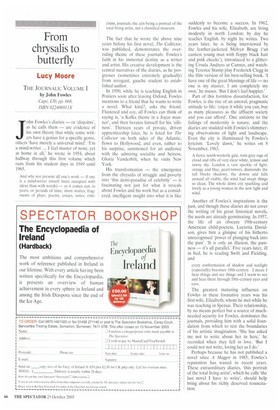From chrysalis to butterfly
Lucy Moore
THE JOURNALS: VOLUME I by John Fowles Cape, £30, pp. 668. ISBN 022406911X John Fowles's diaries — or 'disjoints', as he calls them — are evidence of his own theory that while some writers have a genius for a specific genre, others 'have merely a universal mind'. 'I'm a mind-writer ... I feel master of none, yet at home in all,' he wrote in 1954, about halfway through this first volume which runs from his student days in 1949 until 1965.
And why not present all one's work — if one is a mind-writer (much more occupied with ideas than with words) — as it comes out; in years, or periods of time; short stories, fragments of plays, poems, essays, notes, criti
cisms, journals: the aim being a portrait of the total living artist, not a classified museum.
The fact that he wrote the above nine years before his first novel, The Collector, was published, demonstrates the overriding theme of these journals: Fowles's faith in his immortal destiny as a writer and artist. His creative development is the central narratives of the diaries, as he progresses (sometimes extremely gradually) from arrogant. gauche student to established author.
In 1950, while he is teaching English in Poitiers soon after leaving Oxford, Fowles mentions to a friend that he wants to write a novel. What kind?, asks the friend. Flustered and coy, all Fowles can think of saying is, 'a Kafka theme in a Joyce manner', and then berates himself for his 'silliness'. Thirteen years of private, driven apprenticeship later, he is feted for The Collector on both sides of the Atlantic, flown to Hollywood, and even, rather to his surprise, summoned for an audience with the admiring socialite and heiress, Gloria Vanderbilt, when he visits New York.
His transformation — the emergence from the chrysalis of struggle and poverty into 'this demi-paradise of celebrity' — is fascinating not just for what it reveals about Fowles and his work but as a considered, intelligent insight into what it is like
suddenly to become a success. In 1962, Fowles and his wife, Elizabeth, are living modestly in north London; by day he teaches English, by night he writes. Two years later, he is being interviewed by the leather-jacketed Melvyn Bragg Can earnest young man with floppy black hair and pink cheeks'), introduced to a glittering Ursula Andress at Cannes, and watching Terence Stamp play Frederick Clegg in the film version of his best-selling book. 'I have one of the great blessings of life — no one is my master, I am completely my own,' he muses. 'But I don't feel happier.'
Part of this formless dissatisfaction, for Fowles, is the rise of an amoral, pragmatic attitude to life: 'enjoy it while you can, buy as many pleasures as the affluent society and you can afford'. One antidote to the failings of modernity is nature, and the diaries are studded with Fowles's shimmering observations of light and landscape. Even the city is illuminated by Fowles's lyricism. 'Lovely dawn,' he writes on 8 November, 1963.
A fierce north-westerly gale, torn grey rags of cloud and rifts of very clear white, lemon and tawny sky. London a vast sparkle of light, orange and blue, pearl-towers, diamonds: the tall blocks shadowy, the downs and hills around all visible, the wind had swept things so clean. The whole dawn city sparkling and lovely as a young woman in the new light and wind.
Another of Fowles's inspirations is the past, and though these diaries do not cover the writing of his great historical novels, the seeds are already germinating. In 1957, the life of an obscure 19th-century American child-poetess, Lucretia Davidson, gives him a glimpse of his hitherto unrecognised 'power of plunging back into the past'. 'It is only an illusion, the pastness — it's all parallel.' Five years later, ill in bed, he is reading Swift and Fielding, and
every conformation of shadow and sunlight (especially) becomes 18th-century. I mean I hear things and see things and I seem to see and hear them through 18th-century eyes and ears.
The greatest maturing influence on Fowles in these formative years was his first wife, Elizabeth, whom he met while he was teaching in Spetsai. Their relationship, by no means perfect but a source of muchneeded security for Fowles, dominates the journals, providing him with a solid foundation from which to test the boundaries of his artistic imagination. 'She has asked me not to write about her in here,' he recorded when they fell in love. 'But I could not not write, loving her as I do.'
Perhaps because he has not published a novel since A Maggot in 1985, Fowles's reputation has waned in recent years. These extraordinary diaries, 'this portrait of the total living artist', which he calls 'the last novel I have to write', should help bring about his richly deserved resuscitation.


































































































 Previous page
Previous page